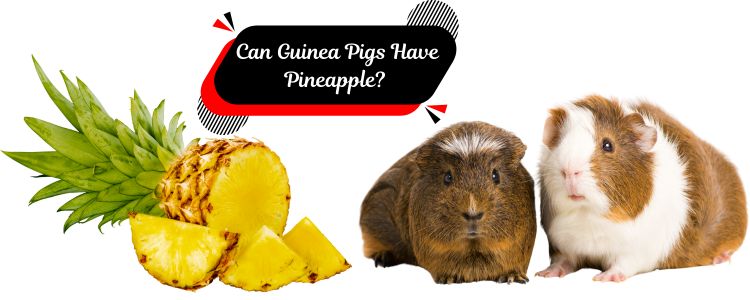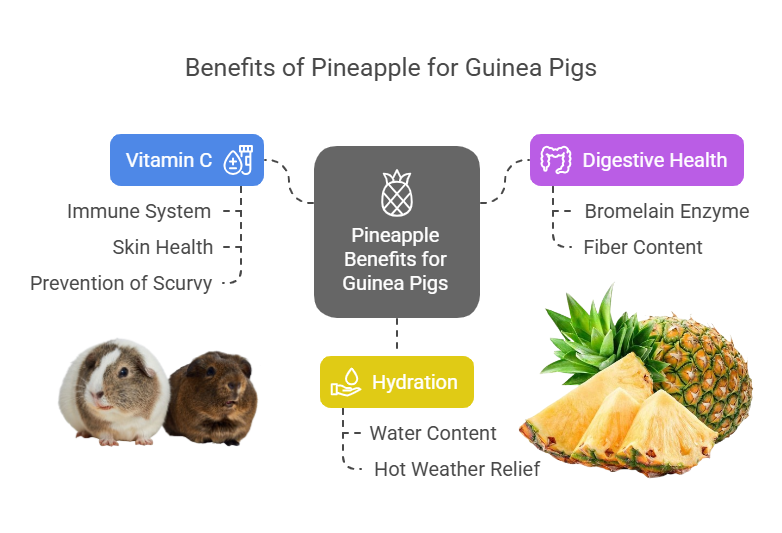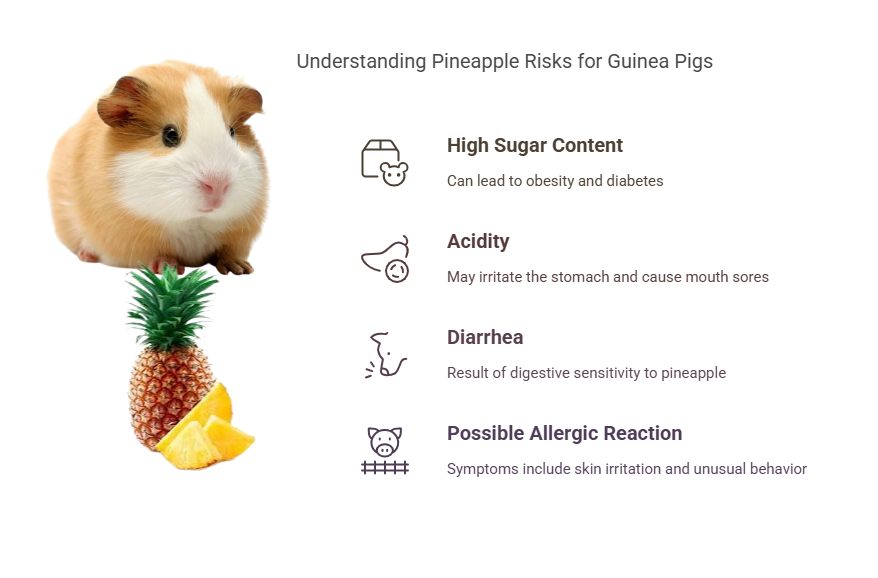Yes, guinea pigs can eat pineapple in small amounts as an occasional treat. Guinea pigs are charming, playful pets that enjoy a varied diet. As a pet owner, you want to ensure your guinea pig stays healthy and happy. But when it comes to fruits, many pet owners wonder, Can guinea pigs have pineapple? Pineapple is sweet and juicy, which may make it tempting to share with your guinea pig. However, it’s essential to understand whether pineapple is a good treat for these small animals or if it poses any risks.
In this article, we’ll dive deep into the question, explore the benefits and potential risks, and give you expert advice on how to safely offer pineapple to your guinea pig.
The Basics of a Guinea Pig’s Diet
Before answering the main question, it’s essential to understand what guinea pigs should be eating daily. Guinea pigs are herbivores, which means their diet consists primarily of plants. They require a high-fiber diet to keep their digestive system healthy, and they rely on fresh hay as their primary food source. Along with hay, guinea pigs should also have fresh vegetables, some fruits, and access to fresh water.
Guinea pigs have sensitive digestive systems, so introducing new foods should be done carefully and in moderation.
Can Guinea Pigs Have Pineapple?
The short answer is yes—guinea pigs can have pineapple. Pineapple is not toxic to guinea pigs, so it’s safe for them to eat in small quantities. However, there are some important things to keep in mind before offering this fruit to your guinea pig.
Benefits of Pineapple for Guinea Pigs
Experts recommend providing a balanced diet that includes a variety of vegetables, hay, and fresh water daily. While fruits like pineapple can provide beneficial nutrients, they should only be an occasional treat.
According to Dr. Bonnie Beaver, DVM,
“Guinea pigs need a diet that is rich in fiber and Vitamin C to stay healthy. Fresh hay and leafy greens should make up the bulk of their meals”
-
Rich in Vitamin C
Guinea pigs cannot produce Vitamin C on their own, which makes it crucial to include foods high in this vitamin in their diet. Pineapple is an excellent source of Vitamin C, which helps maintain a guinea pig’s immune system, skin, and overall health. Vitamin C is also necessary for preventing scurvy, a disease caused by Vitamin C deficiency. -
Digestive Health
Pineapple contains bromelain, an enzyme that may help with digestion. While guinea pigs have different digestive systems from humans, the fiber in pineapple can aid in digestion and keep their system moving smoothly. -
Hydration
Pineapple is made up of about 85% water. Offering small amounts of this juicy fruit can help keep your guinea pig hydrated, especially during hot weather.
Risks of Pineapple for Guinea Pigs
While pineapple can be beneficial in small doses, there are some potential risks to keep in mind.
-
High Sugar Content
Pineapple is sweet and contains a significant amount of natural sugar. Overfeeding your guinea pig with high-sugar fruits can lead to obesity and other health problems like diabetes. Excess sugar can also cause digestive issues, including diarrhea. -
Acidity
Pineapple is acidic, which can sometimes irritate a guinea pig’s sensitive stomach. Overconsumption of acidic fruits may cause mouth sores or discomfort. If you notice your guinea pig is sensitive to pineapple, it’s best to discontinue giving it to them. -
Diarrhea
Guinea pigs’ digestive systems are sensitive, and the high acidity and sugar in pineapple may cause them to experience diarrhea if fed in large amounts. This can lead to dehydration, which is harmful to guinea pigs. -
Possible Allergic Reaction
Some guinea pigs may have an allergy or sensitivity to pineapple. If you notice any signs of allergies, such as skin irritation or unusual behavior, stop giving pineapple immediately and consult with a vet.
How to Feed Pineapple to Guinea Pigs
If you decide to offer pineapple to your guinea pig, it’s essential to do so properly. Here are a few tips for introducing pineapple to your pet’s diet safely:
-
Start Slowly
Begin by offering small pieces of fresh pineapple. You should introduce any new food gradually to see how your guinea pig reacts. If they experience any digestive issues, stop giving pineapple. -
Peel and Core the Pineapple
Before offering pineapple, make sure to peel it and remove the core. The skin of the pineapple can be tough for guinea pigs to digest, and the core may be difficult for them to chew. Only give the soft, fleshy part of the fruit. -
Moderation is Key
Even though pineapple has benefits, it should be given only as an occasional treat. A small chunk of pineapple a few times a week is more than enough. Treat pineapple as a special snack, not as a daily part of their diet. -
Fresh, Not Canned
Always give your guinea pig fresh pineapple. Canned pineapple often contains added sugar and preservatives, which are harmful to guinea pigs. Stick with fresh, natural pineapple to ensure your pet is getting the best quality food.
Other Fruits Guinea Pigs Can Eat
If you’re looking to diversify your guinea pig’s fruit intake, there are several other safe options to consider. Always keep fruits in moderation to prevent sugar overload.
-
Apples
Apples are another fruit high in Vitamin C. Just be sure to remove the seeds, as they contain cyanide, which is toxic to guinea pigs. -
Strawberries
Strawberries are a great source of Vitamin C and antioxidants. Guinea pigs love them, but give them in small portions. -
Blueberries
Blueberries are low in sugar and packed with nutrients. They make a perfect treat for guinea pigs when given sparingly. -
Peaches
Peaches, in moderation, are safe for guinea pigs. Avoid the pit, as it can be dangerous for them. -
Bananas
Bananas are high in potassium and can be given occasionally, but their high sugar content means they should not be a regular part of the diet.
What to Avoid Feeding Your Guinea Pig
While many fruits are safe for guinea pigs, there are some foods you should avoid:
- Citrus Fruits: Oranges, lemons, and limes are too acidic and can upset your guinea pig’s stomach.
- Grapes and Raisins: These are high in sugar and can cause kidney damage in guinea pigs.
- Cherries: The pits in cherries are toxic to guinea pigs.
FAQ About Guinea Pigs and Pineapple
-
Can guinea pigs eat pineapple every day?
No, guinea pigs should not eat pineapple every day due to its sugar and acidity. Limit pineapple to an occasional treat. -
Can guinea pigs eat pineapple leaves?
No, guinea pigs should not eat pineapple leaves. They are tough and difficult to digest, and they may cause choking. -
How much pineapple can I give my guinea pig?
Offer a small piece, about the size of a pea, once or twice a week. Too much pineapple can cause digestive upset. -
What fruits are best for guinea pigs?
Fruits like strawberries, blueberries, and apples are great options for guinea pigs. These fruits are high in Vitamin C and relatively low in sugar. -
Can pineapple help with scurvy in guinea pigs?
Yes, pineapple is a good source of Vitamin C, which can help prevent scurvy in guinea pigs. However, always provide a balanced diet to ensure they get enough Vitamin C.
Bottom Line
In short, guinea pigs can have pineapple, but it should be given in moderation. This fruit offers Vitamin C, aids in digestion, and helps with hydration. However, its high sugar content and acidity make it a less-than-ideal daily food. Always peel the pineapple, remove the core, and give small amounts to avoid any digestive upset. As with any new food, observe your guinea pig closely after feeding them pineapple and consult your veterinarian if you notice any negative reactions.
By providing a well-rounded diet and using fruits like pineapple as an occasional treat, you’ll ensure your guinea pig enjoys a happy, healthy life.



